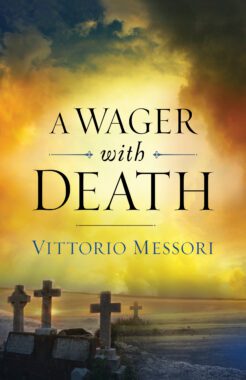A Reflection from “A Wager on Death” by Vittorio Messori
There is another ancient dialogue, equally forgotten if not mocked by the sociotheologians, and equally extraordinary for those who hunger and thirst for life. “Why did God create us?” “He created us,” one responded, “to know Him, to love Him and to serve Him and then to rejoice with Him forever in Paradise.” This is the old catechism, today (rightly so) revised, lengthened, rewritten in narrative form, although the question and response structure is used in the more recent Compendium. But the substance remains the same, always announcing that incredible hope that definitively tears the veil of history: “and then, rejoice forever with Him in Paradise.”
It is an objective fact that only the Church can present herself as a bank of hope, of life, of eternal life! Surely, the question whether her credit is just a boast or if her vaults really do have in them what they promise. But it is a concrete reality that, in a world ever more devastated by a famine of hope, those tellers’ windows are the only ones making this sort of promise.
Among the many, far too many professors who want to teach us how to live, only the Church, pointing to Christ, promises to teach us how to die; or rather, how not to die. She alone proclaims that man is not the segment of a line soon to be brutally interrupted, but a straight line that starts at one point and runs to infinity.
Giorgio Gozzelino, a theologian quoted above, remarks with the simplicity of truth, “The gospel is good news because it announces Paradise.” Gozzelino is a Salesian, a son of Don Bosco, who proposed to the wayward youth he gathered from the streets of nineteenth-century Turin “bread and work.”
This promise made by many during his time and which today many Salesians continue to make, but with the little warning that St. Giovanni Bosco preferred facts to populist declamations and “manifestos”: the first work contracts in Italy (from 1851) bear his name as the guarantor of the worker, complete with working hours, holiday rest, vacation, and protection for apprentices, which nascent socialism did not yet dare to demand. At any rate, only Don Bosco, only a Christian like him, could complete the promise: “Bread, work, and Paradise.”
Let those speak who, unlike those giants, are afraid of words and would rather distinguish, nuance to attenuate the Christian scandal. That perspective on “Paradise,” that promise that what does not merit to die in us will never die, must be stated clearly, because if it is true everything changes for us. Outside of that promise, there is only condemnation, without the prospect of liberation, to exchange for something big what is often just small and base. There is only the suffocation of one who, for lack of anything better, is forced to bow down over his books and study, taking seriously the results of administrative elections of towns with fewer than five thousand inhabitants. Of one who is condemned to doing exegesis, as though it were important, of the bad prose of a provincial secretary of some party during a Sunday assembly. Or of one who is condemned to having always more; to consuming always more. And so, to illude himself with being more.
Guido Ceronetti perhaps not a Christian writer, but certainly sensible to religious matters, says that man reduced to just one dimension, the horizontal, “is damned to the atrocious expiation of never being able to leave the trap of history, to spin around in it like a top gone berserk, without rest or fresh air.”
The Christian God has taken history seriously to the point of incarnating himself in it, of becoming a citizen of it. He is within history, and only in it does the Christian play out his eternal destiny. History is the only dimension where man can find fulfillment. But history is also a life sentence if there is not someone somewhere who (as Vatican II says speaking about the believer’s indispensable social commitment) does not proclaim in the same breath the possibility that man “is not limited only to the temporal horizon but, living in human history, but preserves intact his eternal vocation.”
A Christianity that nuances or hides or even denies its specific identity is not only useless, but dangerous for everyone: opening to an Absolute Future, the hope of a complement to history beyond history, an open door on the line of the horizon. Not by accident is world terrorism crowded with former Catholics. The more devout and clerical their past, the bloodier the present of these brigands and guerrillas.
Indeed, if one occludes the opening that gives a way out of history, the insuppressible Christian tension toward the future that fulfills the possibility of man crumples upon itself and is unleashed within the mere confines of history. Here, the ex-Christian (though not for this reason an ex-believer) sows his need for the absolute.
But history is the kingdom of all that is relative. This is the root of the bloody fury born of delusion, the “religious” need to kill, because there is no religion that does not have sacrificial victims. “Many disasters today are born of the broken tension in many believers with the complicity of certain theologies,” writes Alberto Ronchey, an agnostic journalist. “The world goes to pieces if the need for the absolute is not attenuated by pointing to an afterlife, and if instead the confines of the historical world are sacralized.”
This creates a predicament for everyone when “religious” people lend a hand to politicians in making history the only legitimate dimension of mankind. When this happens, horrors lurk just around the corner: Fascism, Nazism, Marxist-Leninism, Maoism, totalitarianism, and terrorism of every sort. At this point, there is only History with a capital H, which man is obliged to transform into an idola-
trous absolute. There is only Politics, elevated to an obsession that demands that man sacrifice everything: his very life, and before that, the life of others.
To purchase this book, please visit one of the links below.
_

This article on ‘History Ignored is Bound to Repeat Itself’ is adapted from the book A Wager on Death by Vittorio Messori which is available from Sophia Institute Press.
Art for this post on a reflection from “A Wager on Death” by Vittorio Messori; cover used with permission; Photo used in accordance with Fair Use practices.




